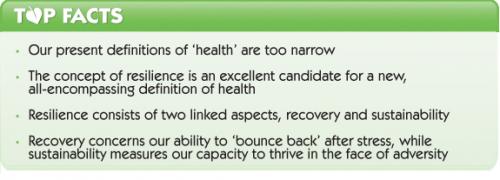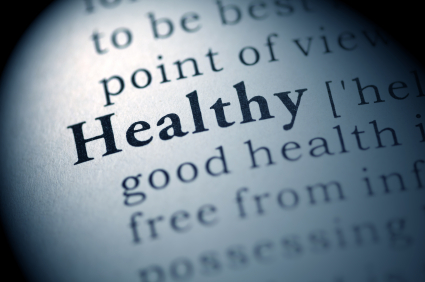Content Sections
We need a new concept of health, and resilience seems to fit the bill. Here’s why.

More than absence of disease
‘Health’ is a tricky concept to define, but ‘absence of disease’ clearly doesn’t cut it: not only because ‘disease’ is another slippery term, but also because it overlooks our potential to boost health way beyond a baseline level. Most of you are doing exactly that every day! The World Health Organization (WHO) uses a much improved definition: “Health is a state of complete physical, mental and social well-being and not merely the absence of disease or infirmity”. However, even this wider definition has no place for the individual’s dual capacity to resist health stressors and regain health post-illness – and even to learn and grow from the experience.
Enter resilience
The concept of ‘resilience’, on the other hand, covers all these bases. Arising from the world of psychology, resilience has been defined as “An outcome of successful adaptation to adversity” by Alex J Zautra and co-authors, of the Resilience Solutions Group at Arizona State University. The authors identify two critical aspects to resilience:
- Recovery, or the ability of individuals to “bounce back and recover fully from challenge”
- Sustainability, or individuals’ capacity to thrive in the face of adversity.
Recovery and sustainability
Zautra et al observe that “Some initial psychological distress following stressful experiences is expected...from a resilience perspective, speed and thoroughness of recovery from harm are the key outcomes to observe.” The same is true of health as a whole: not only psychological/mental health, but physical, emotional and spiritual health as well. We need to consider true health as the ability to recover quickly and completely from potentially health-damaging influences – a concept that has long been widely accepted in terms of recovery from exercise and cardiovascular health.
Turning briefly to sustainability, Zautra et al highlight that ecologists “Define the resilience of an ecosystem as its capacity to absorb perturbations/disturbances before fundamental changes occur in the state of that system.” In other words, sustainability is the capacity of individuals to maintain positive direction and goal seeking in life, whatever life throws at him or her; “To pursue aims that give life meaning,” in the authors’ words.
Widening our concept of health
People without any outward signs of disease are clearly not guaranteed to be truly healthy. Being symptom-free says nothing about whether an individual is on track to develop a disease in a month or a decade, nor does it indicate whether that person is living a positive, productive or happy life. Equally true is the notion that people with diagnosed physical or mental illness may frequently live such happy and fulfilled lives. However, our current, narrow definitions of health exclude these possibilities. Applying resilience-based concepts to health would blow our definitions wide open, and do a far better job of encompassing the complexities of what it means to be human and healthy.
And these are the very concepts that we will be taking directly to governments as we continue our work to help forge improved policies. These should be designed not to help big businesses make us sicker, but rather to help people better manage their health by natural means. That’s what sustainable healthcare is all about.








Comments
your voice counts
20 November 2013 at 8:56 pm
It is ironic that if caught in the midst of health service protocols you must recover twice. Once from the illness and again from the drugs you are given.
21 May 2015 at 7:07 am
Thanks so much for not only sharing this really helpful information, but for putting it all in one spot for easy reference!
Your voice counts
We welcome your comments and are very interested in your point of view, but we ask that you keep them relevant to the article, that they be civil and without commercial links. All comments are moderated prior to being published. We reserve the right to edit or not publish comments that we consider abusive or offensive.
There is extra content here from a third party provider. You will be unable to see this content unless you agree to allow Content Cookies. Cookie Preferences